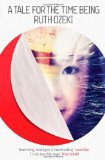Next weekend over
90 international and local writers will gather to participate in the second annual Adelaide Writers’ Week, with six
days of conversation and debate set to take place in the city from this Saturday, March 1, to March 6.
Given Adelaide’s
proximity to Asia, Asian writers are lightly represented, although Rabih Alameddine, the Lebanese-American painter and writer, and Rayya Elias, the Syrian-American author, will be talking about the meeting of the West, and West Asia / the Middle East, Jeet Thayil and Jaspreet Singh will be there from India, and Jung Chang and
Yang Lian will be attending from China.
From a quick
glance at the programme, one highlight looks to be On Travel, on Wednesday March 5, with Sri Lankan-Australian Michelle de Krester and Jaspreet Singh.
In Michelle de Krester's novel Questions of Travel a young woman escapes Australia only to return, and a young man is forced from Sri Lanka. In Jaspreet Singh's Helium a now middle-aged man returns to India in search of his former professor’s wife. Both novels wrangle with the ideas of home, political consequence, memory, history and betrayal.
I also liked the look of Subcultures, on
Thursday March 6, with Jeet Thayil and Australian-Greek Christos Tsiolkas.
Some of contemporary literature’s most compelling stories are set in twilight worlds – say drug dens, and swimming pools at
private schools. Jeet Thayil's acclaimed novel Narcopolis explores opium and heroin addiction on
the shabby streets of Mumbai. Christos Tsiolkas has often exposed the dangerous worlds of the middle class, famously in The Slap, and most
recently in his novel Barracuda.
The many other conversations set to take place will cover topics as varied as the
Great Barrier Reef, both World Wars, clean water, the working
class, NYC in the 70s, colonial Australia, gold
mines, God, politics, apps and the environment.
Laura Kroetsch, Writer's Weeks' director, said: “This year is all about big books and big ideas - be it in fiction, non-fiction
or comics. New to the programme is a day devoted to comic art and illustration. Comics Can Do Anything brings
together artists who explore topics as varied as sexual politics, classic
literature, immigration, family relations, and of course alien creatures. Other sessions feature some of our most acclaimed and often
controversial thinkers for robust conversations about contemporary science,
war’s legacies, and the power of the Church. Not to mention that audiences will enjoy some of today’s most exciting fiction
writers as 2014 is without question one of our strongest line ups of novelists
to date, including Eleanor Catton, who took last year's Man Booker for her novel The Luminaries.”
Comics Can Do Anything, on Sunday March 2, certainly looks interesting, but given Australia's geographic closeness to Asia, the way Manga and Anime have been inspirational to illustrators everywhere, the long history of graphic novels in Asia, the vibrancy of graphic novels now coming out of Asia, and the fact that many readers in our region are obsessed with the form it's disappointing - and perhaps surprising? - that none of the featured graphic novelists is Asian.
Twitterers can follow
the discussion unfold and join in by using #AdlWW. Follow @adelwritersweek for more information. See the full list of live-tweeted sessions
here.









